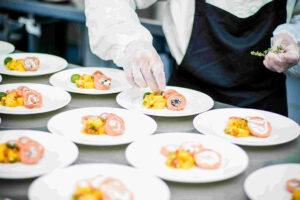
From catering the skies to selling arroz caldo online
How MacroAsia pivoted during the pandemic
RHODEL Esteban, Chief Operating Officer and Vice President of Commercial at MacroAsia Food Group, started out as an aeronautical engineer, but has since pivoted his career into airline catering. From selling nuts and bolts, he says, “Now I’m selling peanuts.” Speaking at the Future of Food 2024 conference at Center for Culinary Arts – Manila (CCA) on March 8, Mr. Esteban discussed the pivots their company has made, specifically during the COVID-19 pandemic, the mists of which have only just lifted.
Prior to the pandemic, the MacroAsia Food Group had been responsible for catering not only to Philippine Airlines (PAL), but also to 16 other airlines. “If you have flown out of Manila, [on] any of these airlines, and if you ate the food, you have been our client,” he said.
Diversification was key: they also had many land-based clients, most of them the casinos around the airport, as well as offices around Manila (he noted that they were the source of the Asian Development Bank’s famous crinkles). The company was established 26 years ago, and he had been part of it for 24.
In March 2019, MacroAsia expanded, setting up two more kitchens to better serve their clients. A year later, the COVID-19 virus had become a worldwide pandemic.
In March 2020, flights were grounded and people were locked in their homes. “Walang lumipad, walang pasahero, sarado ang airport. Anong gagawin namin? (Nobody flew, there were no passengers, the airport was closed. What could we do?),” he said. His superiors told him to check their crisis management manual, which included measures resulting from the superficially similar SARS pandemic in the 2000s. Those measures only considered weeks and months of disaster. “Ilang taon nating idinaan? Tatlong taon (How many years did we go through it? Three years).”
Unfortunately, part of the adjustment meant letting go of people. “The saddest part of my 24 years in MacroAsia was to let go of 1,000 people,” he said, showing social media posts of employees bidding farewell.
He said that their commissary kitchen, measuring 7,000 sqm., managed to operate during those times. Part of their strategy was approaching clients who were still operating, no matter how limited their operations. They then won a contract to feed evacuee sailors quarantined in a hotel.
Going online was also a solution: with PAL’s operations frozen, no people were staying at the Business Class lounge, and therefore, no people were eating its Instagram-famous arroz caldo (the spicy rice porridge had become a status symbol for people flying out of Manila on Business Class). They then started selling it online. They also converted part of their kitchen into an industrial butcher, capable of selling cut meat via the Grab App (which he calculated earned them P300,000 a day).
They then concentrated more on land-based clients, citing, for example, catering to a huge furniture store in the SM Mall of Asia complex which had to open in the middle of the pandemic.
While they are now back to catering to airlines again, they have also accumulated many more land-based clients, including cafeteria operations for retail companies, and even the senior high school department of a university. He said that they ended 2023 with P4 billion in gross revenue.
As he said during his talk, “The true measure of who you are is what you do with what you have.” — Joseph L. Garcia



